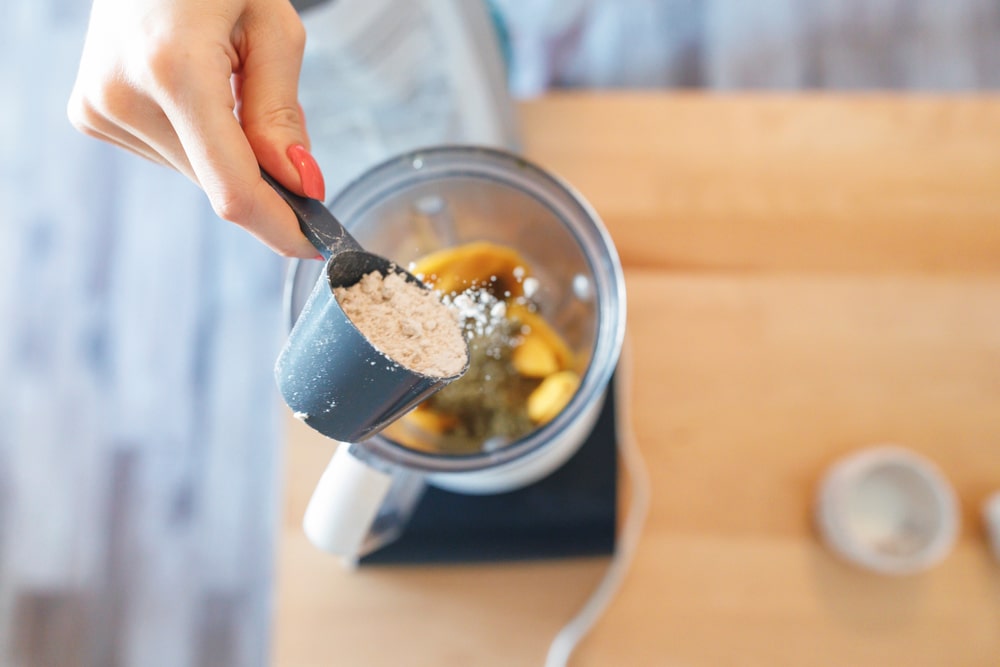
What to Know About Protein Powders
Protein is a highly sought-after nutrient in the health and fitness world. It gives you a long-lasting energy boost and keeps you feeling full. It also helps your body repair itself, which is why it’s great to eat before and after a workout.
The recommended dietary allowance for protein is 0.8 grams for every 2 pounds of your body weight. So how can we hit that magic number? Enter protein powders. A quick walk down any supplement aisle will tell you just how in-demand protein powders are — the selections are endless. Learn about the differences to figure out which is the best protein powder for you.
What to know about 5 common protein powders:
Whey Protein
Pros:
- Often more affordable than other types
- Gluten-free (whey itself is gluten-free, though sometimes the manufacturer adds ingredients that could contain gluten)
- Ideal for bodybuilding
- Contains all 9 essential amino acids, making it a complete protein
Cons:
- Can cause stomach upset
- Not suitable for those who have a milk allergy
Whey is derived from dairy products — it’s a liquid byproduct that is left after cheese is made.
Best in: Whey protein has an aftertaste, so it’s best disguised in shakes, milk, or oatmeal. It comes in a variety of flavors and can be heated, so you can add it to batters when mixing up baked goods. If you’re a diabetic, be sure to check the label — those flavors might include sugar.
Plant-based Protein Powder
Pros:
- Great for non-meat eaters who need a protein boost in their diet
- Rich with the vitamins, minerals, fiber, and nutrients of the plant it is made of
- Suitable for those who have milk allergies or are lactose intolerant
Cons:
- Some plant protein powders can have a strong after-taste (we’re looking at you, pea protein!)
- Plant-based proteins don’t have all 9 amino acids, so you may have to add different kinds of protein into your diet to supplement
- Plant protein can be more expensive
Plant-based protein provides a lot of nutrients and antioxidants without the allergens that come in some types of protein.
Best in: Your favorite smoothie, overnight oats, or plant-based milk.
Collagen Protein Powder
Pros:
- Collagen is known to benefit your:
- Joints
- Bones
- muscles
- Skin
- Hair and nails
Cons:
- Collagen is a no-go for vegans — it’s derived from animals
- It may have ingredients that can affect those with food sensitivities. Read the label carefully before using.
- Not a complete protein
Collagen is a hot ticket item in the supplement world, and with good reason. We’re born with an abundance of collagen, but it depletes and grows weak as we age. Adding collagen to your diet can help.
Best in: Practically everything. Most collagen protein powders are pretty tasteless. It also comes in a variety of flavors. Add a scoop in your morning coffee and get a head-start on your protein intake for the day.
Brown Rice Protein Powder
Pros:
- A satisfying option for those who are celiac or have a gluten intolerance
- Suitable for vegans and vegetarians
- Dairy-free for those who have sensitivities
Cons:
- Not a complete protein
- May cause stomach upset
Brown rice protein powder is a great alternative for those with dietary restrictions.
Best in: All types of food. Brown rice protein powder can have a strong taste so you may want to mix it with flavors that will overpower it.
Egg White Protein Powder
Pros:
- High in protein but low in calories, egg whites are one of the best protein powders for weight loss
- Sugar-free
Cons:
- Not vegan-friendly
- No fun flavors
- Avoid if you’re allergic to eggs
If you’re not a fan of powders that have a ton of ingredients, getting powdered egg whites is a perfect protein boost for you. It’s also sugar-free and low in carbs.
Best in: Sprinkle on salads or any dish that needs an extra boost of protein and pairs well with eggs.
Are protein powders good for me?
Protein powders are an easy, convenient way to add more protein to your diet — you just have to mix and go. However, it’s important to remember that an abundance of even so-called “healthy” items can be harmful, especially if these products have an abundance of sugar.
High levels of protein are also bad for those with certain health problems, like kidney issues. Always check with your doctor before making any big changes in your diet.
Protein powders are not regulated by the FDA. Always thoroughly research any product before making it a staple in your daily nutritional requirement.

Join our Senior Wellness Society for the latest news on Medicare and tips for healthy living in San Diego!
Sign up now ›Are you looking for specialized medical care in San Diego?
Our directory has more than 850 doctors in San Diego County of various specialties who are available to help you.
Find a doctor